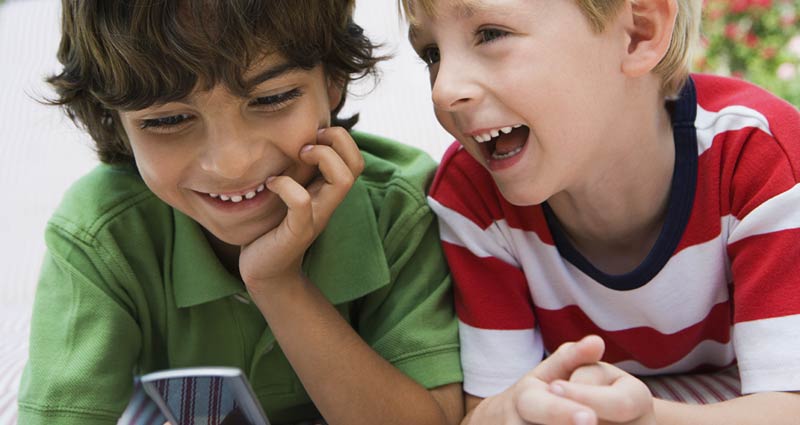Today in the world of digital learning, social media usage in education is unavoidable. Social media platforms continue to develop as avenues offering several educational possibilities for children while letting them stay connected with their friends. Schools also utilize social media channels as learning platforms to engage their students with videos and posts to explain complex concepts quickly.
School kids and college students benefit from social media, as it offers them enough information for research, access to study materials by various authors, connect with students from other universities across the world and get in touch with the experts on their favorite subjects.

Despite having several positive outcomes, social media has a negative side, such as social isolation, cyberbullying, etc., which can be dangerous for small children and teenagers. A significant concern is that the online data stored by your teen is easily accessible and can be exploited by hackers who commit fraudulent activities with personal information and bank details. As a parent, it is essential to know about these social media platforms adverse effects to safeguard your kids’ physical and mental health.
Top 12 Reasons Why Social Media Is Bad For Students
1. Precious Time Is Wasted
Students often indulge in social media platforms for several hours a day, making it challenging to spend a day in their academic activities without their devices. In addition, children who spend a lot of time on social media platforms begin to dislike doing homework or assignments and listening to lectures in class. Instead, students spend most of their free time browsing or scrolling mindlessly and chatting with friends.
2. Prone To Cyberstalking
A significant negative impact of social media on youngsters is that it increases their chances of becoming a victim of cyberstalking. Students love to update their status with their favorite music, food, location, places they check in, and books they read, making it easy for online stalkers to track them. Some follow this habit of setting the status update very religiously and are always eager to check the latest updates from their friends. As a result, the social media accounts of some young children are often the targets of cyberstalkers, which can put them in a dangerous situation.
3. Issues In Sleeping
Social media is the leading cause of sleep-related issues faced by teenagers. They are always on the lookout for viral videos or trending topics. As a result, students spend many late-night hours reading social media posts, disrupting their sleep cycle. Spending too much time on social media causes several sleep-related disorders in teens, like sleep apnea, sleepwalking, and so on.
In a study of adolescents & teens with an average age of 17 were taken up. It was found that they spent around 7.5 hours daily on smart devices, and 62.3% sleeping with their phones on. Boys reported higher social media use than girls. The increased social media usage was linked to poorer sleep quality, shorter sleep duration, and increased depression. (Source)
4. Victims Of Cyberbullying
Several social media accounts spread false rumors and harmful and embarrassing news to targeted online users. Teenagers and middle school students are targets of cyberbullies, which often leads to psychological issues like loneliness, stress, fear, and anxiety. The absence of strict rules concerning cyberbullying crime is the primary reason behind the rise of such activities.
25,000 students across the U.S. were surveyed about cyberbullying.
Results:
- 27% of teens reported experiencing cyberbullying in their lives
- 10% in the past 30 days
- 16% admitted to cyberbullying others
- In 2020, the survey out of 1,034 tweens showed 15% had been cyberbullied
- 3% had cyberbullied others
Source: Cyberbullying Research Center
5. Leads To Social Issues
Sometimes, social media platforms may cause social problems, as students comment and write their thoughts on their social media handles, which may not go well with a specific section of society or hurt public sentiments. Furthermore, few social media users also post disturbing videos or posts, which may implant wrong ideas in the minds of young students. Such activities may lead to the rise of social issues, as the outlook of these students toward societal problems tends to differ due to these misleading posts.
Related Articles
Negative Effects of Facebook on Teens
Positive and Negative effects of Whatsapp on Teens
6. Higher Risk Of Developing Chronic Health Conditions
The primary concern regarding the negative impact of social media is its effect on children’s mental health. You will find many kids and teenagers spending a lot of time playing online games with their virtual friends rather than indulging in outdoor games with their friends. Lack of physical activity and excessive screen time can cause severe health issues like cardiovascular diseases, obesity, anxiety, diabetes, and depression. Doing light workouts every day will be beneficial in releasing endorphins that help youngsters stay positive and combat depression. On the other hand, decreased physical activities lower endorphin secretion and lead to anxiety and depression.
7. Low Self-Esteem
Most teenagers compare their life with celebrities or friends while watching their posts or videos and wish to become rich quickly, follow fad diets to lose weight, or become beautiful like them. Unfortunately, such comparisons usually hurt their confidence levels, esteem, and dignity. They even grow the desire to own expensive cars, dress like their favorite celebrities or friends, and try to cheat or steal from others to satiate such desires.
8. Feeling Of Being Socially Isolated
When teenagers look at videos or images of their friend’s parties to which they were not invited, it leads to depression and anxiety. They begin to develop FOMO or the Fear Of Missing Out and begin to connect with several unknown online individuals to grow their connections. Teenagers stay associated with their online friends and forget to live the present with their family and friends at school. They become socially isolated and avoid family gatherings, meetings, and festivals.
9. Low Levels Of Productivity And Concentration
Students have discussions regarding social media posts or the viral videos they came across in classrooms, which causes low concentration levels and distraction while studying. Indulging in social media also leads to low productivity levels and low grades in academic performance. While handling tasks like assignments, projects, or homework, they follow this habit of checking updates on their social media accounts, which leads to low concentration levels and decreases interest in learning. Plus, too much usage of social media can cause deviation from personal development and career goals.
In a study it was found that Students visually distracted by social media during a lecture had difficulty in recalling visual information. This clearly shows how distraction matters in the way students absorb content. It underscores the importance of lecture strategies that maintain student focus. (Source)
10. Triggers Self-Harm And Suicidal Thoughts
Indulging a lot in social media makes teens crave more attention. They try to gain the attention of their virtual friends by trying activities like suicide or self-harm without thinking about their families. They often have suicidal thoughts due to depression or garner many online views. Some even try to share different methods of suicide and even ask others to try self-harm activities. Studies reveal that when individuals watch a video of death or suicide on social media, it increases their risk of having thoughts of committing suicide.
11. Social Media Addiction
Even though social media helps students to understand their academic concepts easily, uncontrolled usage often leads to addiction. When kids spend a lot of time on social media, they get exposed to inappropriate videos and news content, which may not be suitable for them. If not identified, social media addiction can affect their personality development, mental health, and academic performance.
12. Anger Issues
Studies reveal that students who spend a lot of time on social media channels develop anger issues, which have a harmful impact on their peers, family, and studies. In addition, some students using social media have problems managing their anger issues and end up in the hospital to get treated for neurological disorders and other issues.
13. Information Overload and Reduced Deep Thinking
As per the “The Shallows,” author Nicholas Carr, Internet is changing the way our brains function. He further states in his book that digital tools, including social media, impact our cognitive processes. As a result, these tools might make it harder for people to think deeply and reflectively.
Conclusion
To conclude, social media platforms do not create such issues, but the problem arises when students and teenagers use them excessively. We hope our write-up helped you understand the adverse effects of social media and the risks your teenager would face. Please familiarize yourself with these social media channels and keep an eye on your kid to check whether they crave attention on social media. Maintain good communication with your children daily and set a fixed time for social media usage. Also, monitor your kids’ activity online by installing social media tracking apps to save them from cyberstalkers and cyberbullies.



